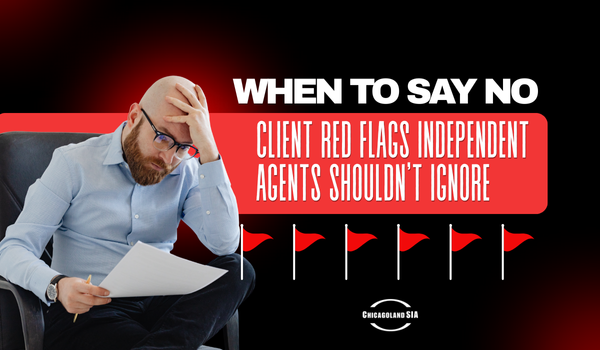When to Say No: Client Red Flags Independent Agents Shouldn't Ignore

In a relationship-driven business, saying "no" can feel counterintuitive, especially for independent agents who pride themselves on finding a way to say "yes." But not every prospect is worth the pursuit, and some clients cost far more than they're worth.
Here are red flags that should give you pause-and, in some cases, a polite pass.
🚩 1. The "Quote Collector"
If a prospect leads with, "I just want to see if you can beat this price," you're not having a real conversation. You're one bid among several they're comparing. These clients rarely convert and often disappear once they've squeezed what they can from your time and expertise.
Why it matters: These prospects tend to ghost after quoting, rarely value coverage explanations, and often don't stay long even if they bind.
What to do: Qualify them early. Ask what they're looking for beyond price, if the answer is "nothing," move on.
🚩 2. "My Last Agent Was Awful" (And So Was the One Before That)
Some clients bounce from agent to agent, blaming each for missteps, delays, or denied claims. While some may have legitimate grievances, others are chronic complainers, or worse, chronic liars.
Why it matters: If every past agent was "incompetent," odds are the issue is the client. You may be next.
What to do: Ask for specifics on why they left their last agent and listen for signs of unreasonable expectations or shifting blame.
🚩 3. "Can You Just Fudge That a Little?"
This one's non-negotiable. If a prospect asks you to backdate coverage, misstate occupancy, underreport revenue, or "leave out" a loss, your answer should be a firm no-and a quick exit.
Why it matters: It puts your license at risk and jeopardizes carrier relationships.
What to do: Shut it down immediately and document the interaction in case the client later files a complaint.
🚩 4. The "Everything's a Crisis" Client
Some clients can't distinguish between urgent and important. They call, text, or email at all hours. They demand same-day service for every minor concern, and no matter how quickly you respond, it's never fast enough.
Why it matters: These clients drain your energy and dominate your calendar, often at the expense of your better-behaved clients.
What to do: Set clear boundaries from the start. If they push back, they're not a good fit.
🚩 5. The Underinsured Business Owner
They run a high-risk business, have serious coverage gaps, and balk at every premium you quote. You spend hours explaining exposures and compliance, only to be told, "We'll just risk it."
Why it matters: They'll likely ignore your advice, bind the bare minimum, and blame you when something goes wrong.
What to do: Document everything. Have them sign a written acknowledgment that they refused specific coverage recommendations. If they refuse critical coverage, consider declining the business entirely.
🚩 6. Frequent Claims, Suspicious Losses
If you're approached by someone who's filed multiple claims in a short time, or has vague or inconsistent stories about past losses, proceed with caution.
Why it matters: This client may be seen as too risky by carriers or could trigger non-renewals that affect your standing.
What to do: Run loss runs early. If the history is too volatile, decline before you invest further time.
Don't Be Afraid to Walk Away
Saying no protects your time, your reputation, and your business. Trust your gut, and if something feels off, it probably is. Remember: not every client is your client.


